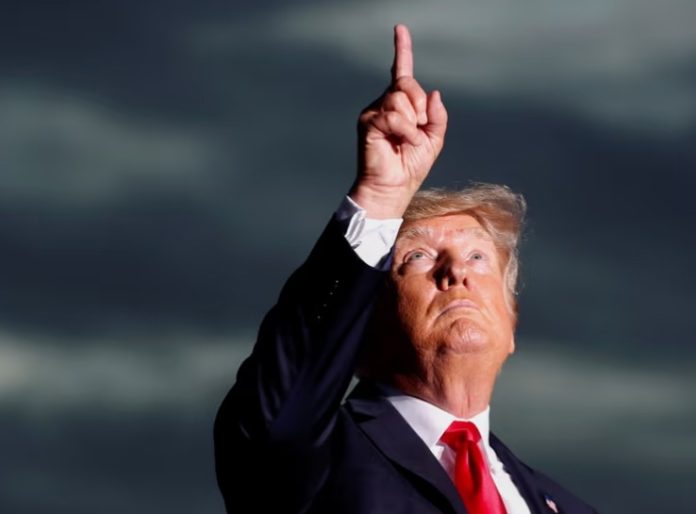Donald Trump has more legal problems for 2023, and his attempts to delay his trials have met with varying degrees of success.
The former US president faces at least five major cases involving allegations of interference in state and federal elections, payment of gimmick money, mishandling of classified US documents and illegal business practices. At every stage, his legal team has tried to delay the proceedings by seeking procedural continuances or requesting deadlines that would delay the start of the trial, sometimes until after the November 2024 election.
Donald Trump remains the presumptive nominee of the Republican Party, with a significant lead over his rivals in national polls.
Republicans will kick off the primary season when they hold their first nominating contest in Iowa on 15 January. That contest will include public caucuses, known as primaries, where people will gather to discuss and vote for a candidate.
But the legal liability facing Trump has set the stage for an unprecedented campaign season in which the leading candidate is known for winding legal intrigues fraught with jail time, not his campaign speeches.
Closing arguments in the New York state civil fraud case will take place next month. It is the only case against Donald Trump to go to trial in 2023. The lawsuit was filed by New York Attorney General Letitia James. It involves allegations that Trump inflated the value of his real estate to get favourable loan terms from banks and understated its value when reporting to state authorities to avoid paying taxes.
Judge Arthur Engoron on Monday rejected Trump’s attempt to end the case with a verdict in his favour after prosecutors from James’ office completed 11 weeks of arguments.
At stake is the future of Trump’s business in New York, where he has turned his name into a national symbol of wealth and prosperity. Engoron has already found Trump, his sons and his business liable for fraud. The trial should determine whether Trump’s business empire will be dissolved and how much they will have to pay in financial penalties. James noted in a statement:
While the judge already ruled in our favor and found that Donald Trump engaged in years of significant fraud and unjustly enriched himself and his family, this trial revealed the full extent of that fraud — and the defendants’ inability to disprove it. As with the other cases against him, Trump has denied wrongdoing, maintaining that the legal challenges against him are part of an orchestrated campaign of “election interference,” and a witch hunt.
A “hush money” case is also unfolding in New York. Trump separately faces a 34-count indictment for falsifying business records in connection with cash payments made to adult film star Stormy Daniels and Playboy model Karen McDougal. Both have claimed extramarital affairs with Trump. The payments were made during Trump’s first election to the White House, which began in 2015.
Prosecutors allege that Trump tried to hide them by charging former longtime Trump lawyer Michael Cohen as fees. In fact, the fees were allegedly compensation for Cohen’s year-long payoffs to women. Cohen, who has had a falling out with Trump, has testified before the grand jury that brought the charges and is expected to be a key witness for the prosecution.
Meanwhile, special counsel Jack Smith is pursuing two cases against Trump in federal court, centred on the issue of Trump’s criminal interference in the 2020 election and his mishandling of classified US documents after leaving the presidency in January 2021.
Trump’s legal team is trying to get the election interference case dismissed, citing presidential immunity. The judge hearing the case, Tanya Chutkan, rejected that claim, prompting an appeal from Trump’s legal team. Smith asked the Supreme Court to hear the case quickly to save the trial date, which is scheduled for 4 March in Washington.
Unlike in federal cases, Trump will not be able to pardon himself if he is re-elected and convicted on charges in Georgia and New York. Presidential pardon authority only applies to federal crimes, not state or local crimes.
The Georgia case, like the federal case, also involves allegations of election interference. But it only involves alleged acts committed within the southern state in a case brought by Fulton County District Attorney Fanie Willis.
Trump was indicted on a number of election interference-related offences in August.
A state grand jury indicted Trump and 18 of his political allies on a 41-count indictment, charging the former president with violating the Georgia Racketeer Influenced and Corrupt Organisations Act (RICO), solicitation to violate the oath of office of a public official, conspiracy to impersonate a public official, conspiracy to commit perjury and other crimes.
Last month, prosecutors proposed a trial start date of 5 August, but Trump’s team has yet to file a motion. Instead, attorneys have asked Fulton County Superior Court Judge Scott McAfee to hold a hearing on the matter.
